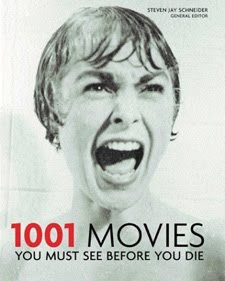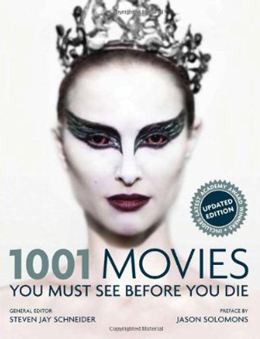About 10 years ago I got this book.
I don't remember exactly how it came to my family, but I would bet money that we scooped it up from the bargain bin at Borders (RIP) and bought it on impulse.
When I moved out of my parents' house, I took the book with me. I've bought other movie books over the years, but I always come back to this one because I like the reviews in it so much. I spent so many hours looking at it in college that my friends got to know it too and years later my roommate Annie mentioned how often I pulled it out during hangouts at our apartment. At some point I went through and highlighted the names of the movies I'd seen, and for a couple years I passively watched others on the list. I only watched the ones I thought I would like and ignored the rest.
Recently I started reading more about film history and realized that for a young person (born in the late 1980s) who has never studied film in any formal way and has no involvement in the industry, I got decent exposure to films from the Classic Era just from growing up with my dad in the house. There used to be a family-owned video store down the street from where we lived that inexplicably had a fantastic collection of old movies and rentals were only $1. During the summer months, we would watch a movie almost every day. My dad would make a suggestion about something he had seen as a kid, and then I'd run up to the store and get it and we'd watch it. When I got to be middle-school age, a Blockbuster opened in town and rang the first death knell for this amazing family-owned video store. My life was never the same after that point. To say Blockbuster's selection pales in comparison is an understatement.
I have always liked hearing my dad's stories about the first time he saw something really memorable because they seemed so different from my own movie-going experiences. I never got to experience watching
Star Wars for the first time on a big screen, but I could live vicariously through his memory of having done so. Dad's movie-going experiences seemed so much more mind-blowing than my own. I grew up in the age of CGI, where the most frequent debate is whether or not special effects look "realistic" enough. (Never mind that they often show things that could never happen in real life.) In contrast to that, my dad would often say about classic movies "Oh, you gotta see this on a big screen!" and tell me how magical it was seeing something for the first time in a theater. I always felt a twinge of jealousy when he would relate these stories. He grew up in Chicago during a time in which you could take the L to the movie theater; buy a movie ticket, a soda, and popcorn; and take the train home again, all for less than $1.
For the most part, I liked the movies my dad showed me. Some of them I could relate to better than others. I remember the time he raved on and on about how brilliant
American Graffiti was, and then when I watched it just seemed like a movie about kids driving around in cars. I didn't get it at the time why he likes it so much, but I understand now - it captures the feel of growing up in 1960s America that my dad remembers. It's something I will never be able to experience myself and can only try to understand by living vicariously through the memories of others.
I have tons more stories about movies and my dad, but I'll save them for later down the road. Which brings me to....
THE PROJECT
Pondering all these things led me to a crazy idea. What if I watched all the 1001 movies listed in the book in chronological order? Up until now I'd just cherry-picked and watched the ones I thought I would like, but that was giving me an incomplete picture of movie history. If I went back to the beginning and watched the movies in order, it'd give me a better picture of how film developed from its infant stage to become an art form and then the universal life force that it is now.
Granted, I'm still only watching a fraction of the movies out there. But 1001 movies is no small feat and it will at least be a significant sampling of the artistic achievements made up until now.
So I went out and bought the most recent copy of the book I could find, the 7th edition that lists movies through 2010.
So that's my quest. To watch all 1001 movies, in order, and blog about it so I have a record. If you do the math, averaging one movie per week will make this project approximately
20 years long. I'm going to do my best and watch more than one movie per week so I can get it done a little quicker.
But there is one problem. Since the book is based around a finite number (1001) this means that with every subsequent edition, new movies are added and a few have to be deleted. If I want to do a complete job with this project, I'll have to watch all the movies that have been listed in every edition. So I'm actually going to watch more than 1001 movies. That is, if I don't die or give up before completing this project.
This is by no means intended to be a solitary journey. There are lots of movies on the list that I probably won't be able to sit through unless I have someone else there with me. To that end, a few people have already signed on to walk with me for part of it. My dad will probably join me for everything by Kurosawa and all the war movies. For scary movies (not my fave genre....), I have other friends I am counting on to anchor me down to the couch.
This is a crazy-ambitious project, but I'm hoping it will be fun and I will come out of it knowing a lot of interesting things. The
list of movies is posted on other blogs, if you'd care to see. You are welcome to join me on some or all of this quest.
Here we go.



